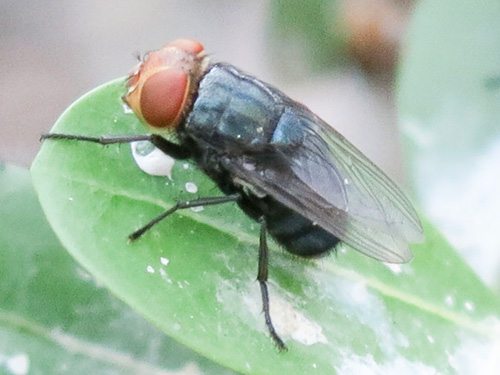Alert Issued for New World Screwworm
May 23, 2025

Tennessee State Veterinarian Dr. Samantha Beaty is urging animal owners to be aware of New World Screwworm (NWS), an invasive pest that poses a serious threat to livestock and other warm-blooded animals, including pets.
NWS is a parasitic fly whose larvae feed on the living tissue of warm-blooded animals, causing painful infected wounds. Adult flies are slightly larger than houseflies, with metallic blue/green bodies, orange eyes, and three dark stripes on their backs.
Although the pest was eradicated from the United States decades ago, recent detections in Mexico highlight the potential for reintroduction and spread, particularly in southern states. USDA recently announced the suspension of live cattle, horse, and bison imports along the southern U.S. border in response to NWS. However, Tennessee’s position along key travel, wildlife migration, and trade corridors heightens the need for increased awareness.
“An international border means nothing to NWS or wildlife that may be carrying the larvae,” Dr. Beaty said. “Livestock and pet owners should carefully inspect their animals and report any unusual or persistent wounds. NWS can cause devastating health impacts to affected animals, and early detection is critical to containment and treatment efforts. As with many animal health concerns, awareness and prevention go a long way in reducing the risk of spread to Tennessee.”
What to Look For:
Domesticated species that could be affected include cattle, sheep, goats, pigs, horses, and other mammals, including pets and, in rare cases, humans.
Animal owners should be vigilant for NWS by checking animals regularly—especially if animals have traveled internationally. Owners should inspect wounds and treat them promptly. If owners or producers are moving pets or livestock across borders, owners should ensure the animals are properly inspected and obtain appropriate movement permits and documents.
If you suspect NWS, contact the State Veterinarian’s office at 615-837-5120 or the USDA Area Veterinarian in Charge at 615-517-2642. On weekends and evenings, call 866-536-7593. Suspicious cases will be evaluated, and samples may be submitted for laboratory confirmation. The Tennessee Department of Agriculture Animal Health Division will assist veterinarians with sample collection and submission.
The following are USDA information links on New World Screwworm:
New World Screwworm
Pest Alert: New World Screwworm
New World Screwworm What You need to Know
NWS is a parasitic fly whose larvae feed on the living tissue of warm-blooded animals, causing painful infected wounds. Adult flies are slightly larger than houseflies, with metallic blue/green bodies, orange eyes, and three dark stripes on their backs.
Although the pest was eradicated from the United States decades ago, recent detections in Mexico highlight the potential for reintroduction and spread, particularly in southern states. USDA recently announced the suspension of live cattle, horse, and bison imports along the southern U.S. border in response to NWS. However, Tennessee’s position along key travel, wildlife migration, and trade corridors heightens the need for increased awareness.
“An international border means nothing to NWS or wildlife that may be carrying the larvae,” Dr. Beaty said. “Livestock and pet owners should carefully inspect their animals and report any unusual or persistent wounds. NWS can cause devastating health impacts to affected animals, and early detection is critical to containment and treatment efforts. As with many animal health concerns, awareness and prevention go a long way in reducing the risk of spread to Tennessee.”
What to Look For:
- Wounds that won’t heal or worsen over time
- Foul-smelling discharge or visible larvae (maggots) in a wound
- Signs of discomfort or unusual behavior, such as animals avoiding feed or isolating themselves
- Infestation may be found in wounds resulting from routine procedures such as castration, dehorning, or branding, or from minor injuries like insect bites.
Domesticated species that could be affected include cattle, sheep, goats, pigs, horses, and other mammals, including pets and, in rare cases, humans.
Animal owners should be vigilant for NWS by checking animals regularly—especially if animals have traveled internationally. Owners should inspect wounds and treat them promptly. If owners or producers are moving pets or livestock across borders, owners should ensure the animals are properly inspected and obtain appropriate movement permits and documents.
If you suspect NWS, contact the State Veterinarian’s office at 615-837-5120 or the USDA Area Veterinarian in Charge at 615-517-2642. On weekends and evenings, call 866-536-7593. Suspicious cases will be evaluated, and samples may be submitted for laboratory confirmation. The Tennessee Department of Agriculture Animal Health Division will assist veterinarians with sample collection and submission.
The following are USDA information links on New World Screwworm:
New World Screwworm
Pest Alert: New World Screwworm
New World Screwworm What You need to Know